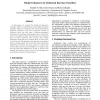1414 search results - page 29 / 283 » Relational peculiarity-oriented mining |
ICDM
2008
IEEE
14 years 3 months ago
2008
IEEE
Recent research has shown that collective classification in relational data often exhibit significant performance gains over conventional approaches that classify instances indi...
KDD
2004
ACM
14 years 9 months ago
2004
ACM
Procedures for collective inference make simultaneous statistical judgments about the same variables for a set of related data instances. For example, collective inference could b...
ICDM
2005
IEEE
14 years 2 months ago
2005
IEEE
The presence of autocorrelation provides a strong motivation for using relational learning and inference techniques. Autocorrelation is a statistical dependence between the values...
KDD
2003
ACM
14 years 9 months ago
2003
ACM
Large and complex graphs representing relationships among sets of entities are an increasingly common focus of interest in data analysis--examples include social networks, Web gra...
ICDM
2003
IEEE
14 years 1 months ago
2003
IEEE
In this paper we present the Relational Bayesian Classifier (RBC), a modification of the Simple Bayesian Classifier (SBC) for relational data. There exist several Bayesian classif...

